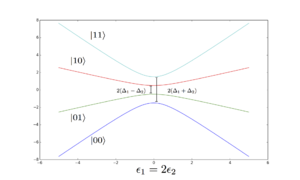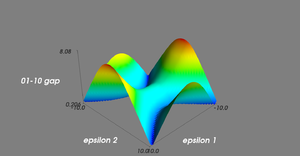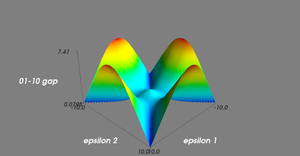|
|
| Line 56: |
Line 56: |
|
|
|
|
|
which to second order in <math>\epsilon_1</math> are: |
|
which to second order in <math>\epsilon_1</math> are: |
|
|
|
|
|
[[Image:Second order.png|thumb|Energy gap between 01 and 10 states as a function of both detunings. Here, <math>\Delta_1 = 2</math>,<math>\Delta_2 = 1</math>, and <math>g = 1</math>, so the gap is invariant to second-order fluctuations in <math>\epsilon_1</math>.|300px]] |
|
|
|
|
|
<math> |
|
<math> |
| Line 80: |
Line 82: |
|
|
|
|
|
Unfortunately, none of the other transitions can be made to be invariant to second order fluctuations in <math>\epsilon_1</math>. Also, If we wish to make this transition invariant to all second order detuning fluctuations, we must set <math>\Delta_1 = \Delta_2</math>, making <math>g = 0</math>. |
|
Unfortunately, none of the other transitions can be made to be invariant to second order fluctuations in <math>\epsilon_1</math>. Also, If we wish to make this transition invariant to all second order detuning fluctuations, we must set <math>\Delta_1 = \Delta_2</math>, making <math>g = 0</math>. |
|
|
|
|
[[File:Second order.png]] |
|
|
|
|
|
|
===Tunnel Coupling and Capacitive Coupling Noise=== |
|
===Tunnel Coupling and Capacitive Coupling Noise=== |
|
|
[[Image:equal_deltas.png|thumb|Energy gap between 01 and 10 states as a function of both detunings. Here, <math>\Delta_1= \Delta_2 = 1</math>. Although the second order effects of the detunings are non-zero, they are relatively small.|300px]] |
|
Assuming that we sit at the sweet spot <math>\epsilon_1 = \epsilon_2 = 0</math>, the energies are relatively simple, so we can easily see the effect of noise on the other parameters. |
|
Assuming that we sit at the sweet spot <math>\epsilon_1 = \epsilon_2 = 0</math>, the energies are relatively simple, so we can easily see the effect of noise on the other parameters. |
|
|
|
|
| Line 101: |
Line 102: |
|
|} |
|
|} |
|
|
|
|
|
Note that if we want any of the transitions to be invariant to first-order fluctuations in tunnel coupling, we would need to set <math>\Delta_1 = \Delta_2</math> or set either <math>\Delta_1</math> or <math>\Delta_2</math> to zero. Any of these changes however would make the energy levels degenerate, which must be avoided. The conclusion therefore is that we cannot make the transitions invariant to first-order fluctuations in tunnel coupling. |
|
Note that if we want any of the transitions to be invariant to first-order fluctuations in tunnel coupling, we would need to set either <math>\Delta_1</math> or <math>\Delta_2</math> to zero or set <math>\Delta_1 = \Delta_2</math>. The first change would make the energy levels degenerate, which must be avoided. If we set the tunnel couplings to be equal, it would be impossible to make any of the transitions invariant to second order effects in the detuning. |
|
|
|
|
|
Similarly, there is nothing we can do short of making the energy levels degenerate to make the transitions invariant with respect to first-order fluctuations in capacitive coupling. We could, however, make the coupling itself as stable as possible through manipulating the geometry of the system.
|
|
There is nothing we can do short of making the energy levels degenerate to make the transitions invariant with respect to first-order fluctuations in capacitive coupling. We could, however, make the coupling itself as stable as possible through manipulating the geometry of the system. |
|
|
|
|
|
==Rotations== |
|
==Rotations== |
This project started in the Fall of 2014, focusing on the operation of two or more charge qubits which are capacitively coupled.
General Formulation

Energy levels of the 2 qubit system as a function of both detunings.
For a single charge qubit, the Hamiltonian is

We will refer to  and
and  as the detuning and tunnel coupling of qubit
as the detuning and tunnel coupling of qubit  , respectively.
, respectively.
We can further write down the full Hamiltonian explicitly:

where  is the capacitive coupling between the qubits.
is the capacitive coupling between the qubits.
Sweet Spots
A major issue with charge qubits is that they are very susceptible to charge noise, which occurs when charge fluctuations outside the system induce undesired shifts in the parameters of the Hamiltonian. The goal of a sweet spot is to find a point in the parameter space where the energy levels are as invariant to the shifts as possible.
First Order Detuning Noise
The most dominant noise source is due to the shifts in the detuning. It is believed that the only point at which the first order dependence on the detunings disappears is at  . This has been confirmed analytically in the limit of small
. This has been confirmed analytically in the limit of small  , and no exceptions have been observed numerically.
, and no exceptions have been observed numerically.
Gap between 01 and 10 states
Gap between 00 and 11 states
Gap between 00 and 01 states
Gap between 00 and 10 states
Second Order Detuning Noise
For  , we have the following energy levels:
, we have the following energy levels:




which to second order in  are:
are:

Energy gap between 01 and 10 states as a function of both detunings. Here,

,

, and

, so the gap is invariant to second-order fluctuations in

.




The second order terms cannot be tuned such that all gaps are invariant to second order noise. However,  can be tuned such that some of the transitions become invariant to some of the second order detuning shifts. To make the transition between
can be tuned such that some of the transitions become invariant to some of the second order detuning shifts. To make the transition between  and
and  flat with respect to second order fluctuations in
flat with respect to second order fluctuations in  , we can set
, we can set

Unfortunately, none of the other transitions can be made to be invariant to second order fluctuations in  . Also, If we wish to make this transition invariant to all second order detuning fluctuations, we must set
. Also, If we wish to make this transition invariant to all second order detuning fluctuations, we must set  , making
, making  .
.
Tunnel Coupling and Capacitive Coupling Noise

Energy gap between 01 and 10 states as a function of both detunings. Here,

. Although the second order effects of the detunings are non-zero, they are relatively small.
Assuming that we sit at the sweet spot  , the energies are relatively simple, so we can easily see the effect of noise on the other parameters.
, the energies are relatively simple, so we can easily see the effect of noise on the other parameters.
| State
|
Energy
|
Effect of 
|
Effect of 
|
 |
 |
 |

|
 |
 |
 |

|
 |
 |
 |

|
 |
 |
 |

|
Note that if we want any of the transitions to be invariant to first-order fluctuations in tunnel coupling, we would need to set either  or
or  to zero or set
to zero or set  . The first change would make the energy levels degenerate, which must be avoided. If we set the tunnel couplings to be equal, it would be impossible to make any of the transitions invariant to second order effects in the detuning.
. The first change would make the energy levels degenerate, which must be avoided. If we set the tunnel couplings to be equal, it would be impossible to make any of the transitions invariant to second order effects in the detuning.
There is nothing we can do short of making the energy levels degenerate to make the transitions invariant with respect to first-order fluctuations in capacitive coupling. We could, however, make the coupling itself as stable as possible through manipulating the geometry of the system.
Rotations
SECTION IN PROGRESS
After bringing the system adiabatically to the sweet spot  , we can apply an AC pulse to some of our parameters to induce a rotation within the system.
, we can apply an AC pulse to some of our parameters to induce a rotation within the system.
| AC Pulse
|
Resulting Matrix (Lab Basis)
|
Resulting Matrix (Energy Basis)
|
 |
 |

|
 |
 |

|
 |
 |

|
 |
 |

|


















































